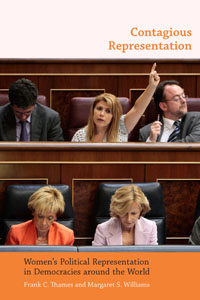As we begin another Women’s History Month, I have to wonder how the dearth of women in public life will affect the celebration of this month in the future. Whether we are talking about Presidential Cabinets or Fortune 500 companies, too few women are participating in public life. The absence of women is a problem whether viewed as a loss of talent or a loss of opportunity to represent women’s interests. But what can be done? Some think that women need to assert themselves more, to “lean in” as it were, creating a greater presence in the workforce to gain more than what they currently have. Others argue that change needs to come from the institutions themselves by recruiting women to higher ranking or more prestigious positions. When talking about overcoming centuries of socialization into particular roles and fewer opportunities, it seems to me that both efforts need to be pursued.
Teaching women how to be more assertive alone will not help women achieve their goals overnight. In fact, there is a substantive body of political science literature that says it could backfire, with women being perceived more harshly than their assertive male colleagues. Moreover, the idea that women need to think bigger about their goals or paths to success misses the point that women are as ambitious as men—they want higher ranking office and bigger salaries. Who doesn’t? The problem is, women see more barriers to achieving it, or they think more about the effect on their family life than men do. Women face institutional barriers that thwart their ambitions, so institutional change needs to be a part of the conversation.
Institutional actors need to reach out to these ambitious women to help them achieve their goals. Quotas laws (used in some countries to ensure greater participation by women), recruitment, and mentoring also need to be a part of the process for increasing women’s participation. Even a broader discussion of how to balance work and family by those who are attempting to do so can be helpful. But women who seek more need to make their ambitions known. Women need to seek out mentors to help them achieve their goals, and they need to take opportunities when they are available instead of seeing all the reasons why they shouldn’t. If there are no women willing to take the risk and aim for more power and prestige, we lose not only examples for future generations, but we may also lose any reason to celebrate this month.
Margaret S. Williams is the co-author (with Frank C. Thames) of Contagious Representation: Women’s Political Representation in Democracies around the World (NYU Press, 2013).

